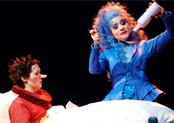OPERA SEARCH

Pinocchio, burattino di talento
(Pinocchio, the talented puppet) Two Act Version (2001)Libretto by Paolo Madron with the collaboration of Jetske Mijnssen, based on 'Le avventure di Pinocchio' by C. Collodi; German version by Hanna Francesconi; English version by Benjamin Gordon; Spanish version by Pablo Valdes; French version by Catherine Fourcassié (I,G,E,S,F)
2S,M,T,BBar,B,14 child soloists; children's chorus; 1.1.1.1-2.1.0.0-perc(2):I=bongos/2cowbells/2SD/claves(susp)/congas/glsp(C#3,D3)/whip/pedal dr/hi-hat/susp.cym/tamb/military dr/3timp/4tom-t/tgl/wdbl; II=cowbell/aeolian chimes/t.bells(F1-G1)/SD/claves(susp)/congas/cyms/glsp/lg parade dr(with cym)/guiro/maracas/4metallophones(SSAB)/susp.cym/ratchet/tamb/tgl/wdbl-pft-strings
Abbreviations (PDF)
Bote & Bock
Komische Oper, Berlin
Jetske Mijnssen, director
Conductor: Anna-Sophie Brüning
Company: Ensemble Komische Oper
| PINOCCHIO | Soprano |
| GEPPETTO | Bass/Baritone |
| THE FAIRY | Soprano |
| THE CAT | Mezzo-Soprano |
| THE FOX | Tenor |
| MANGIAFUOCO | Bass |
| LUCIGNOLO | child’s voice |
| Two Policemen | children’s voices |
| ARLECCHINO | child’s voice |
| PULCINELLA | child’s voice |
| INNKEEPER | child’s voice |
| SNAIL | child’s voice |
| Dr RAVEN | child’s voice |
| Dr OWL | child’s voice |
| Four Hares | children’s voices |
| TUNA FISH | child’s voice |
| The Speaking Cricket, Choir of Marionettes, Choir of Wayfarers to Schlauraffen Land, Choir of Fish | children’s chorus |
The woodcarver Geppetto has created an animated puppet called Pinocchio. Geppetto sends Pinocchio, who can move unaided, to school, but Pinocchio prefers to go to the puppet theatre instead. Mangiafuoco, the director, is fed up with telling the same fairytales over and over again and gives Pinocchio money so that he can travel around the world and find new stories for him. Pinocchio is robbed by two scoundrels and has to flee from the police because he is unable to pay for his meal at the inn. A pigeon takes him to the fairy’s house, but by the time the snail opens the door for him, Pinocchio has frozen stiff in the cold outside.
After the animals have already prepared his burial, the fairy revives him. Pinocchio denies all of his foolishness, but his nose keeps on getting longer. The fairy exhorts him not to lie anymore.
Pinocchio continues his journey and meets his old friend Lucignolo. The two boys plan to travel to the place where every wish is fulfilled instantly and no one has to go to work or school. However, the land of the idle turns out to be an illusion conjured up by an evil sorcerer, who catches the children and turns them into donkeys. Distraught at his new appearance, Pinocchio throws himself into the sea, the fish nibble off his donkey’s ears and, finally, he is gobbled up by a shark. In the shark’s stomach, he finds Geppetto, who has been searching the world high and low for Pinocchio for years. Pinocchio regrets what he has done and carries the old man out on his shoulders. Now that he has saved his father, he is now fully a human being.
“A story of fables and animals comes to life…” Märkische Allgemeine
“The Italian composer retells the famous classical story by Carlo Collodi in an entirely fresh fashion, with 57 child actors and five adult roles. Framed by a velvety blue stage, the wooden puppet … experiences, in the truest sense of the word, utterly beautiful adventures… The individual, short scenes enable even smaller children to get involved in the story… The staging never aims for a cheap laugh and avoids sentimentality… Cheerful, totally free of false pathos…” Mitteldeutsche Zeitung
“The production was an immediate success with the audience (10 minutes of cheers, applause and stamping of feet at the end)… In his gentle music Valtinoni follows a little the great masters of musical fairy tales: there is much of Maurice Ravel in the sparkling piano introduction played against the pizzicato strings and in the brass solos, both sad and beautiful. This music, however, is simpler and more direct, slightly leaning towards Puccini and Bernstein…” Berliner Zeitung
Poetic
